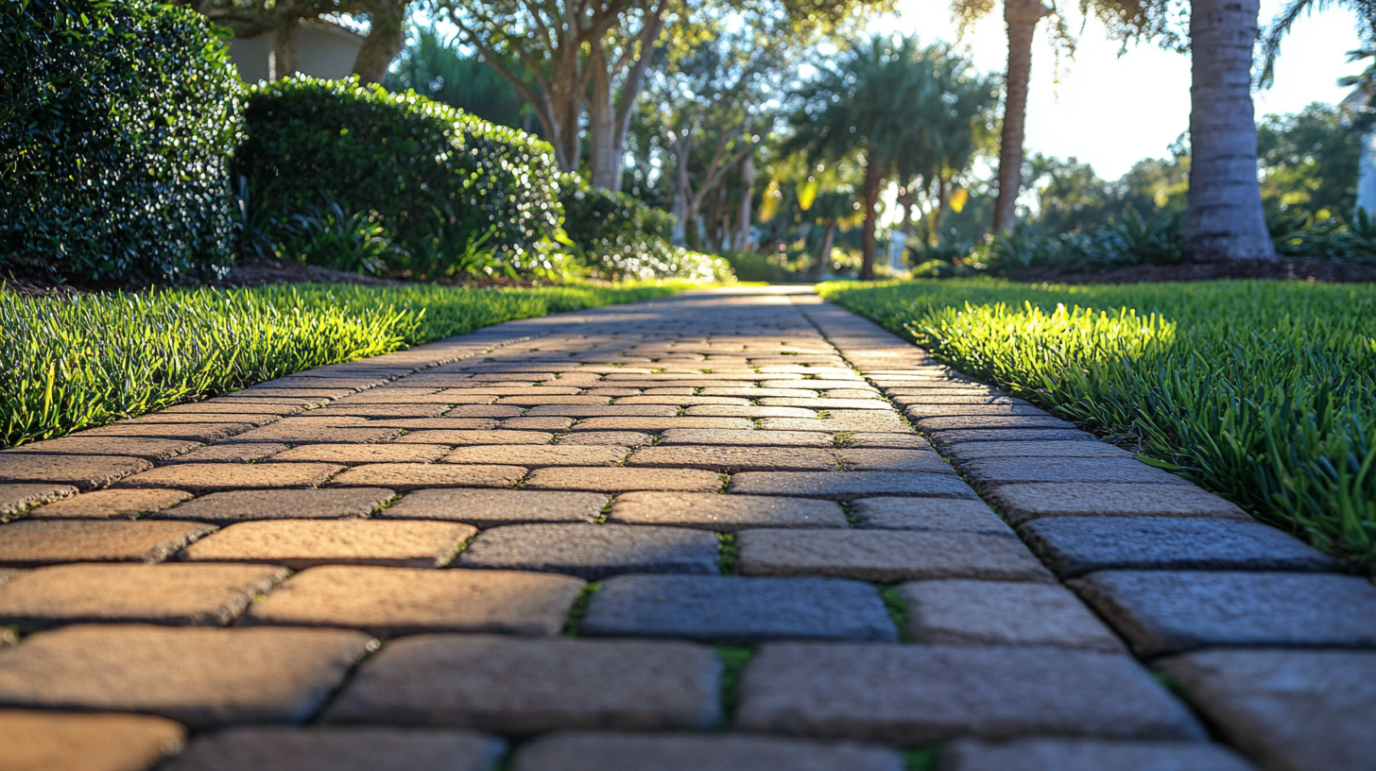
Weeds in pavers are frustrating for many homeowners in St. Petersburg, FL. It also affects surrounding areas like Clearwater and Seminole. After winter rains, these pesky plants thrive in the gaps between pavers, making your driveway, patio, or pool deck look unkempt. If left unchecked, weeds can also weaken the structure of your pavers, leading to the need for paver repair.
The good news is that there are effective ways to remove weeds and prevent them from coming back. Sealing pavers is one of the best long-term solutions to stop weed growth and protect your outdoor spaces. In this article, we’ll explain why weeds grow between pavers, how to remove them, and how professional paver services can help keep your outdoor areas looking their best.
Why Do Weeds Grow Between Pavers?
Many homeowners assume that weeds in pavers grow from underneath, but that’s not always the case. In most instances, weeds sprout from seeds that settle in the joints between pavers. Here are a few common reasons why this happens:
- Moisture and Organic Debris: Florida’s humid climate and frequent rain create the perfect environment for weed growth. Dirt, sand, and leaves trapped in the joints provide a natural seedbed for weeds.
- Poorly Installed or Worn-Out Joint Sand: The sand between pavers helps hold them in place and prevents weed growth. Over time, rain and foot traffic can wash away this sand, leaving gaps where weeds can take root.
- Lack of Paver Sealing: Unsealed pavers are more vulnerable to moisture, dirt buildup, and weed growth. Sealing pavers creates a protective barrier that prevents weeds from finding a place to grow.
Once weeds start growing, they can quickly spread, making it harder to keep your pavers looking clean. That’s why taking proactive steps to eliminate them and prevent future growth is essential.

How to Remove Weeds from Pavers
If you already have weeds in pavers, removing them properly is key to preventing regrowth. Here are the most effective methods:
- Manual Removal: Pulling weeds by hand or using a weeding tool is a simple solution for small areas. Be sure to remove the entire root to prevent regrowth. This method works best after rain when the soil is soft.
- Boiling Water: Pouring boiling water over weeds can kill them instantly by breaking down their cell structure. This method is chemical-free and safe for most pavers but may need many applications.
- Vinegar Solution: A mixture of white vinegar and water can be sprayed directly onto weeds. The acetic acid in vinegar dries out the plant, killing it over time. However, vinegar can also affect nearby plants, so use it carefully.
- Pressure Washing: A pressure washing service can blast away weeds and the dirt that helps them grow. This method is great for deep cleaning but should be followed by re-sanding the joints to prevent weed regrowth.
- Herbicides: If weeds are persistent, a targeted herbicide can be used. Choose an eco-friendly option to avoid harming surrounding plants and wildlife.
Removing weeds is just the first step. To keep them from returning, it’s essential to take preventative measures like sealing pavers and adequately maintaining your hardscape.
Preventing Weeds from Growing in Pavers
Once you’ve removed weeds, the next step is to prevent them from returning. Here are the best ways to keep your pavers weed-free long-term:
- Re-Sand the Joints: After removing weeds or pressure washing, refill the joints with polymeric sand. This special sand hardens when wet, creating a strong barrier that helps block weed growth.
- Sealing Pavers: Sealing pavers protect against moisture, dirt buildup, and weed growth. A high-quality paver sealant locks in the sand between joints and prevents weeds from taking root.
- Regular Cleaning: Sweeping and rinsing your pavers regularly removes debris that can trap moisture and create a breeding ground for weeds. Periodic pressure washing also helps maintain a clean surface.
- Proper Drainage: Poor drainage can lead to water pooling between pavers, encouraging weed growth. Ensuring your pavers are installed with a slight slope can help prevent standing water issues.
By following these steps, you can extend your pavers’ life and keep them pristine year-round. If weeds remain a problem, consider professional paver repair to address underlying issues.

When to Call a Professional for Paver Repair and Sealing
If weeds keep growing between your pavers despite your best efforts, it could be a sign of a more significant issue. Uneven pavers eroded joint sand, and poor drainage can all contribute to persistent weed problems.
Professional paver repair can help by addressing these underlying issues and restoring your outdoor space. Here’s how All Around Tampa Paver Services can help:
- Paver Repair: If your pavers are shifting or sinking, weeds will continue to grow in the gaps. Professional repair services can re-level and stabilize your pavers to prevent future weed problems.
- Sealing Pavers: A high-quality paver sealing service creates a protective barrier, keeping moisture and weed seeds out. This prevents weed growth and enhances the color and durability of your pavers.
- Deep Cleaning & Maintenance: Regular pressure washing removes dirt, mold, and weeds. Meanwhile, re-sanding the joints reinforces the structure of your pavers.
If you’re dealing with weeds in pavers and need expert help, contact All Around Tampa Paver Services. Our team provides top-notch paver repair, sealing, and cleaning services in St. Petersburg and nearby areas. Call us at (727) 291-9436 or complete our contact form to schedule a consultation today!
